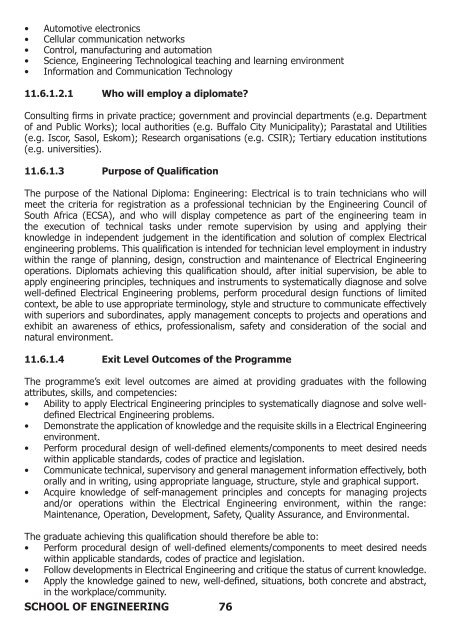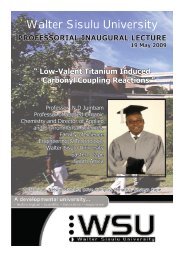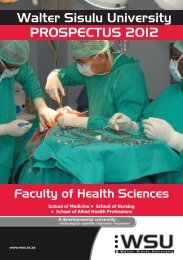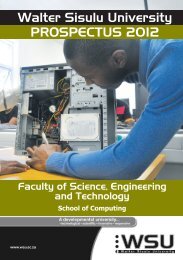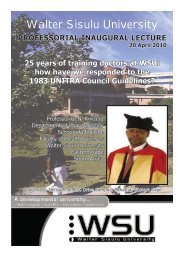School of Engineering prospectus 2012 - Walter Sisulu University
School of Engineering prospectus 2012 - Walter Sisulu University
School of Engineering prospectus 2012 - Walter Sisulu University
You also want an ePaper? Increase the reach of your titles
YUMPU automatically turns print PDFs into web optimized ePapers that Google loves.
• Automotive electronics<br />
• Cellular communication networks<br />
• Control, manufacturing and automation<br />
• Science, <strong>Engineering</strong> Technological teaching and learning environment<br />
• Information and Communication Technology<br />
11.6.1.2.1 Who will employ a diplomate?<br />
Consulting firms in private practice; government and provincial departments (e.g. Department<br />
<strong>of</strong> and Public Works); local authorities (e.g. Buffalo City Municipality); Parastatal and Utilities<br />
(e.g. Iscor, Sasol, Eskom); Research organisations (e.g. CSIR); Tertiary education institutions<br />
(e.g. universities).<br />
11.6.1.3 Purpose <strong>of</strong> Qualification<br />
The purpose <strong>of</strong> the National Diploma: <strong>Engineering</strong>: Electrical is to train technicians who will<br />
meet the criteria for registration as a pr<strong>of</strong>essional technician by the <strong>Engineering</strong> Council <strong>of</strong><br />
South Africa (ECSA), and who will display competence as part <strong>of</strong> the engineering team in<br />
the execution <strong>of</strong> technical tasks under remote supervision by using and applying their<br />
knowledge in independent judgement in the identification and solution <strong>of</strong> complex Electrical<br />
engineering problems. This qualification is intended for technician level employment in industry<br />
within the range <strong>of</strong> planning, design, construction and maintenance <strong>of</strong> Electrical <strong>Engineering</strong><br />
operations. Diplomats achieving this qualification should, after initial supervision, be able to<br />
apply engineering principles, techniques and instruments to systematically diagnose and solve<br />
well-defined Electrical <strong>Engineering</strong> problems, perform procedural design functions <strong>of</strong> limited<br />
context, be able to use appropriate terminology, style and structure to communicate effectively<br />
with superiors and subordinates, apply management concepts to projects and operations and<br />
exhibit an awareness <strong>of</strong> ethics, pr<strong>of</strong>essionalism, safety and consideration <strong>of</strong> the social and<br />
natural environment.<br />
11.6.1.4 Exit Level Outcomes <strong>of</strong> the Programme<br />
The programme’s exit level outcomes are aimed at providing graduates with the following<br />
attributes, skills, and competencies:<br />
• Ability to apply Electrical <strong>Engineering</strong> principles to systematically diagnose and solve welldefined<br />
Electrical <strong>Engineering</strong> problems.<br />
• Demonstrate the application <strong>of</strong> knowledge and the requisite skills in a Electrical <strong>Engineering</strong><br />
environment.<br />
• Perform procedural design <strong>of</strong> well-defined elements/components to meet desired needs<br />
within applicable standards, codes <strong>of</strong> practice and legislation.<br />
• Communicate technical, supervisory and general management information effectively, both<br />
orally and in writing, using appropriate language, structure, style and graphical support.<br />
• Acquire knowledge <strong>of</strong> self-management principles and concepts for managing projects<br />
and/or operations within the Electrical <strong>Engineering</strong> environment, within the range:<br />
Maintenance, Operation, Development, Safety, Quality Assurance, and Environmental.<br />
The graduate achieving this qualification should therefore be able to:<br />
• Perform procedural design <strong>of</strong> well-defined elements/components to meet desired needs<br />
within applicable standards, codes <strong>of</strong> practice and legislation.<br />
• Follow developments in Electrical <strong>Engineering</strong> and critique the status <strong>of</strong> current knowledge.<br />
• Apply the knowledge gained to new, well-defined, situations, both concrete and abstract,<br />
in the workplace/community.<br />
SCHOOL OF ENGINEERING<br />
76


